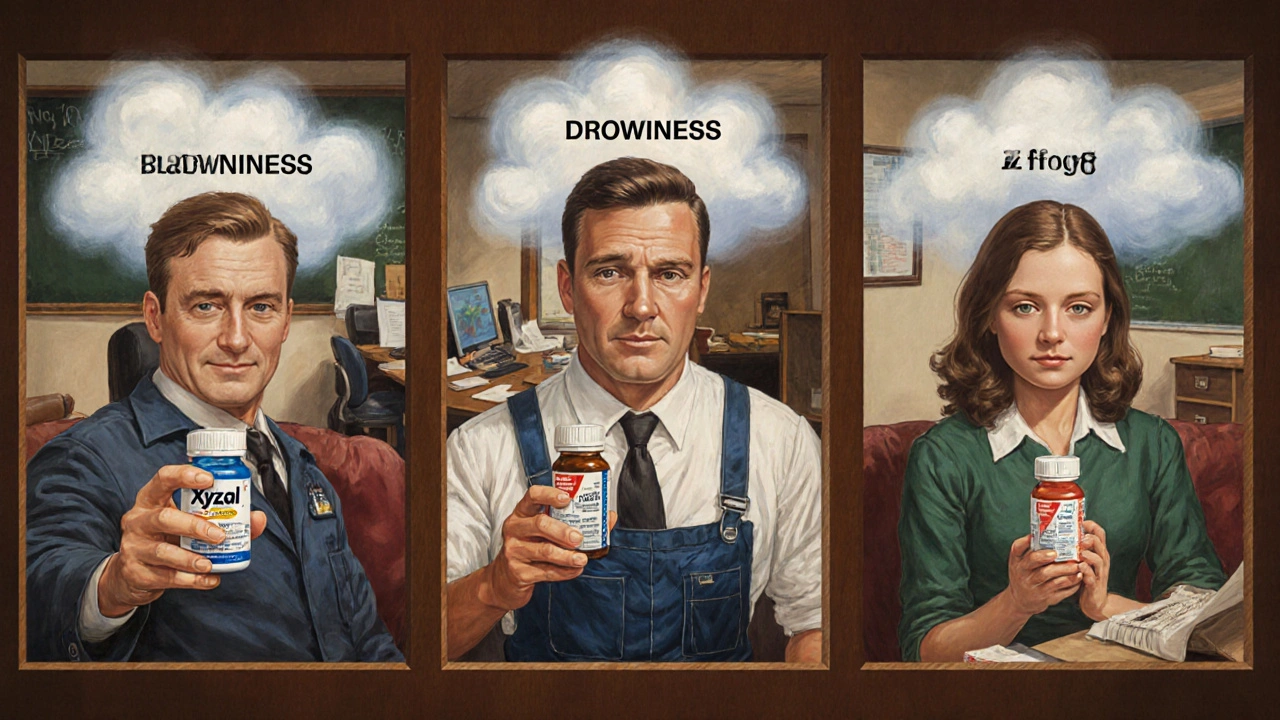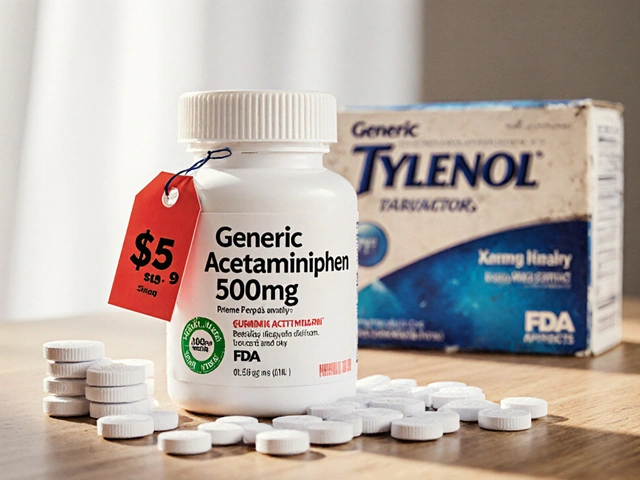Allergy Medication Drowsiness Risk Calculator
This tool helps you understand which allergy medication might cause less drowsiness based on your specific needs and lifestyle. Cetirizine (Zyrtec) contains a mix of active and inactive molecules, while levocetirizine (Xyzal) is the purified active ingredient.
Why One Makes You Sleepy and the Other Doesn’t - Even Though They’re Almost the Same
If you’ve ever taken Zyrtec and felt like you were drugged by noon, you’re not alone. Millions of people use cetirizine and levocetirizine for allergies, but only some notice the difference - and it’s not just in their heads. One is a cleaner, more targeted version of the other. And that small chemical tweak changes how your brain reacts.
Both drugs work the same way: they block histamine, the chemical your body releases when it thinks pollen, dust, or pet dander is an invader. That stops sneezing, itching, and runny noses. But here’s the catch - cetirizine is a mix of two molecules. One works. The other doesn’t. And that extra molecule? It’s partly why you feel tired.
What’s the Real Difference Between Zyrtec and Xyzal?
Cetirizine, sold as Zyrtec, is a racemic mixture. That’s a fancy way of saying it’s made of two mirror-image molecules: 50% levocetirizine (the good one) and 50% dextrocetirizine (the one that doesn’t help with allergies). Think of it like a pair of gloves - one fits your left hand perfectly, the other doesn’t. But you’re still wearing both.
Levocetirizine, sold as Xyzal, is just the left-handed glove. It’s the purified active ingredient. No extra baggage. That’s why it’s called a third-generation antihistamine - it’s a refined version of the second-generation cetirizine. You get the same allergy relief with half the dose: 2.5 mg of levocetirizine equals 5 mg of cetirizine in effectiveness.
Studies back this up. In a 2008 trial with 18 healthy volunteers, levocetirizine 2.5 mg blocked histamine reactions just as well as cetirizine 5 mg. But here’s the key: the group taking cetirizine reported more drowsiness. Not everyone. Not always. But enough to make a noticeable difference.
Sedation: The Real Reason People Switch
If you’re choosing between these two, the biggest factor isn’t price or brand - it’s whether you wake up feeling clear-headed.
Levocetirizine has a lower chance of crossing the blood-brain barrier. That’s the filter between your bloodstream and your brain. Cetirizine slips through more easily. That’s why some people feel foggy, sluggish, or like they’ve had one too many cups of coffee at 3 p.m.
Real-world data from over 1,200 user reviews on Drugs.com shows levocetirizine scores higher for side effects - 6.7 out of 10 versus cetirizine’s 5.8. Common complaints about cetirizine? “Makes me sleepy even at night,” “I can’t focus at work,” “I feel hungover without drinking.”
On Reddit’s r/Allergies, users consistently report switching from Zyrtec to Xyzal and noticing a “huge difference.” One user wrote: “I used to nap after lunch. Now I don’t even feel the need to close my eyes.”
But it’s not universal. Some people feel zero drowsiness on cetirizine. Others still feel a little tired on levocetirizine. Everyone’s brain chemistry is different. Genetics, liver function, even what you ate that morning can change how your body handles these drugs.

Side Effects Beyond Drowsiness
Both drugs are safe for most adults and kids over 6. Common side effects - dry mouth, headache, sore throat - are nearly identical. Neither causes weight gain, high blood pressure, or heart issues like older antihistamines (think Benadryl).
But cetirizine’s labeling includes a stronger warning about drowsiness. The FDA says it may impair mental or physical abilities. That’s why it’s not recommended before driving or operating heavy machinery - even if you think you’re fine.
Levocetirizine’s label says the same thing, but the risk is lower. In clinical trials, about 6% of people on levocetirizine reported drowsiness versus 14% on cetirizine. That’s more than double. For someone working in an office, driving a truck, or caring for kids, that difference matters.
Cost and Availability: Is the Upgrade Worth It?
At the pharmacy counter, cetirizine costs around $13 for 30 tablets of 10 mg. Levocetirizine runs about $14.50 for 30 tablets of 5 mg. On the surface, they’re almost the same price. But here’s the trick: you’re taking half the dose of levocetirizine. So you’re getting the same effect for the same money.
Insurance plans often treat them the same. If you’re paying out-of-pocket, the price gap is negligible. The real cost is how much drowsiness costs you - missed meetings, slower reaction times, or just feeling off all day.
Levocetirizine is less common in pediatric doses, which is why cetirizine still dominates children’s allergy prescriptions. But for adults - especially those who work, drive, or need to stay sharp - levocetirizine is the smarter pick.
Who Should Take Which?
Here’s a simple guide:
- Take cetirizine if: You don’t get drowsy from it, you want the cheapest option, or you’re treating a child. It works just as well for most people.
- Take levocetirizine if: You’ve ever felt sluggish after Zyrtec, you have a job that demands alertness, or you’re sensitive to medications. You’ll get the same relief with less brain fog.
There’s no right or wrong. It’s personal. But if you’re unsure, try levocetirizine first. If you feel fine, stick with it. If you don’t notice a difference, switch back. No harm done.

What Experts Say - And Why It Matters
Dr. Michael Foggs, President of the American College of Allergy, Asthma, and Immunology, says: “For patients who get drowsy on cetirizine, switching to levocetirizine at half the dose often gives the same control with less sleepiness.” That’s not marketing. That’s clinical experience.
But not everyone agrees. Dr. Robert Naclerio from the University of Chicago says the difference is “overstated.” He argues that both are considered non-sedating by modern standards. And he’s right - compared to first-gen antihistamines like diphenhydramine, both are lightweights.
Still, if you’re choosing between two nearly identical drugs, and one gives you less drowsiness, why not pick the better one?
How to Test Which One Works for You
Don’t guess. Test.
- Take cetirizine 10 mg daily for 7 days. Keep a note: Did you feel tired? Did your concentration drop? Did you nap without meaning to?
- Stop for 2 days to clear your system.
- Take levocetirizine 5 mg daily for 7 days. Same questions.
Compare your notes. Most people can tell the difference after just a few days. If you feel the same? Stick with the cheaper one. If you feel clearer? Make the switch.
And remember - if you’re still feeling drowsy on either, talk to your doctor. It might not be the antihistamine. It could be another medication, sleep apnea, or even stress.
What’s Next for These Drugs?
Researchers are already working on next-gen versions. In 2023, a new combo pill with levocetirizine and montelukast (a leukotriene blocker) hit the market for people with stubborn allergies. Extended-release versions are in testing too - meaning one pill could last 24 hours without a spike in drowsiness.
And soon, genetic testing might tell you which antihistamine your body handles best. Until then, the simplest test is the one you can do at home: try both, track how you feel, and choose the one that lets you live your day - not fight it.
Is levocetirizine stronger than cetirizine?
No, it’s not stronger - it’s more precise. Levocetirizine 2.5 mg works just as well as cetirizine 5 mg because it’s the pure active ingredient. You don’t need more of it to get the same effect. The difference isn’t in strength, but in how clean the dose is.
Can I take cetirizine and levocetirizine together?
No. They’re essentially the same drug. Taking both together doesn’t make your allergies better - it just doubles your risk of side effects like drowsiness, dry mouth, or dizziness. Stick to one, and use the right dose.
Does levocetirizine help with hives?
Yes. Both cetirizine and levocetirizine are FDA-approved for chronic hives (urticaria). They work equally well at reducing itching and swelling. Many dermatologists prefer levocetirizine for patients who need daily treatment but can’t tolerate drowsiness.
How long does it take for levocetirizine to start working?
Levocetirizine starts working within 1 hour, with full effects by 2-3 hours. It lasts 24 hours, so one dose a day is enough. Cetirizine works just as fast. The speed isn’t the difference - the clarity after taking it is.
Is it safe to take these every day?
Yes. Both are approved for daily, long-term use in adults and children over 6. Studies have tracked people taking them for over a year with no serious side effects. If you’re using them for seasonal allergies, you can start before symptoms begin and keep going until the season ends.
Will I get addicted to levocetirizine?
No. Antihistamines like levocetirizine are not addictive. You won’t develop a tolerance that makes them stop working. If your allergies get worse, it’s likely because your exposure to triggers increased - not because the drug lost its power.
If you’re still unsure which one to pick, talk to your pharmacist. They can help you compare prices, check for interactions with other meds, and suggest the best fit for your lifestyle. No need to guess - you’ve got the info. Now choose the version that lets you breathe easy - without nodding off.






Comments
Jackie R
30/Oct/2025If you're still taking Zyrtec and feeling like a zombie, you're not just lazy-you're clueless. Levocetirizine exists for a reason. Stop being cheap with your brain.
Josh Arce
30/Oct/2025bro what even is a racemic mixture is that like when your wifi splits into 2.4 and 5ghz? also why is xyzal so expensive if it's just half the pills?
Alexis Hernandez
30/Oct/2025I used to swear by Zyrtec until I started working remote and realized I was nodding off during Zoom calls. Switched to Xyzal and it's like someone flipped a switch in my head. Not magic, just cleaner chemistry. Also, I tried both for a week like the post said-keep a journal, folks. Your future self will thank you.
brajagopal debbarma
30/Oct/2025so you paying $14.50 for 5mg when you can get 10mg for $13? american capitalism at its finest. also i take cetirizine and i'm fine why you so mad?
Carly Smith
30/Oct/2025I read this whole thing and still don't know if I should switch or not but I'm definitely gonna try it because I feel like I should
Kurt Stallings
30/Oct/2025The real issue is pharmaceutical marketing masquerading as science. Both drugs are identical in mechanism. The difference is in the label. You're paying for the word 'levo'.
Angie Creed
30/Oct/2025Let’s be honest: this isn’t about pharmacology. It’s about the illusion of control. We want to believe that a tiny molecular tweak can restore our dignity, our focus, our *essence*. But in truth, we’re just chasing the ghost of productivity in a world that’s designed to make us tired. Levocetirizine isn’t the solution-it’s the placebo for the anxious middle class.
Michael Ferguson
30/Oct/2025I've been on cetirizine for 12 years and I've never felt drowsy once. Not even a little. I work 12-hour shifts as a paramedic and I've never missed a call because I was 'foggy.' So when I see people treating this like some kind of life-changing epiphany, it makes me sick. You're not special. You're just lazy. The drug isn't the problem-your sleep hygiene is. You're probably scrolling TikTok until 2 a.m. and then blaming your meds for your exhaustion. I've seen it a hundred times. People take one pill, feel nothing, then decide they 'need' the expensive version because they think their body is too delicate for the cheap one. Newsflash: your liver doesn't care about your Instagram aesthetic. If you're tired, go to bed. Drink water. Stop treating antihistamines like a personality upgrade.